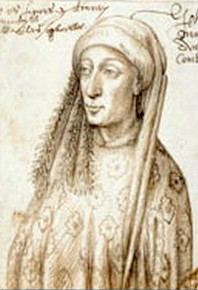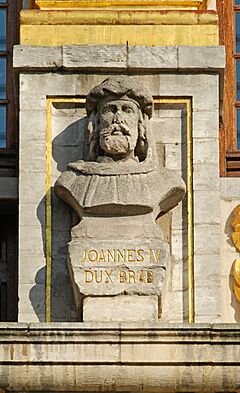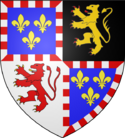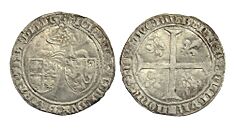John IV, Duke of Brabant facts for kids
Quick facts for kids
John IV, Duke of Brabant
|
|
|---|---|

Early 17th century portrait by Antoine de Succa
|
|
| Born | 11 June 1403 Arras |
| Died | 17 April 1427 (aged 23) Brussels |
| Buried | Saint John the Evangelist Church, Tervuren |
| Noble family | Valois |
| Spouse(s) | Jacqueline, Countess of Hainaut |
| Father | Antoine of Burgundy |
| Mother | Jeanne of Saint-Pol |
John IV, Duke of Brabant (born June 11, 1403 – died April 17, 1427) was an important ruler in the Middle Ages. He was the son of Antoine of Burgundy, who was the Duke of Brabant, Lothier, and Limburg. John was the second duke from the House of Valois family to rule Brabant. He is most famous for starting the University of Louvain (Leuven) in 1425, which is still a well-known university today.
Contents
Becoming Duke of Brabant
John was born in Arras. He became the Duke of Brabant in 1415. This happened after his father died in a big battle called the Battle of Agincourt.
However, not everyone agreed with John becoming duke right away. The Holy Roman Emperor, Sigismund, didn't want him to rule. Sigismund wanted to stop the Valois family (John's family) from becoming too powerful.
But John had strong support. His uncle, John the Fearless, who was the Duke of Burgundy, backed him. The local government, known as the States of Brabant, also supported John. Their combined help stopped another war over who should rule the duchy. Because John was still young, the States of Brabant helped govern the duchy until he was old enough.
Marriage to Jacqueline of Hainaut
In 1418, John married Jacqueline, Countess of Hainaut. Jacqueline was a powerful countess who ruled several areas. Her supporters hoped that John would protect her lands from her uncle, John III.
Through their marriage, many important regions were joined together. These included the counties of Holland, Zeeland, and Hainaut. Also, the duchies of Brabant and Limburg were united. This kind of joining, where one person rules several separate areas, is called a personal union.
Marriage Challenges
Sadly, John and Jacqueline's marriage didn't bring the peace they hoped for. They grew apart by 1420. One big problem was John's difficulty in protecting Jacqueline's rights in Holland and Zeeland. His efforts, like the failed Siege of Dordrecht in 1418, were not enough against her uncle, John III.
Another issue was that John's closest advisors were part of a group called the "Cod" faction. Jacqueline's supporters belonged to the "Hook" faction. These two groups were rivals in the Hook and Cod disputes. This political difference caused many problems between the couple.
Because of his advisors, John even made Jacqueline's uncle, John III, the temporary ruler of Holland in 1420. This open support for her uncle made Jacqueline very upset. She left John's court and said their marriage was no longer valid.
After John III died in 1425, Holland once again came under John IV's control. However, he quickly made his cousin, Philip the Good, the new temporary ruler. Philip was also named John's heir if John died without children.
Tensions in Brabant
The fact that John's advisors were from the "Cod" faction caused trouble not only in his marriage but also in the Duchy of Brabant itself. Many cities and nobles were unhappy with these powerful advisors. They had been powerful under John's father's rule.
When Jacqueline left John in 1420, the States of Brabant sided with her. They even appointed John's brother, Philip of Saint-Pol, as the temporary ruler of Brabant.
John tried to react strongly against these actions. But an uprising by the guilds (groups of skilled workers) in Brussels stopped him. This meant John had to agree to their demands for a while. A peace agreement was made in 1421, and John got back his full powers as duke. In return, he gave more rights to the cities and the States of Brabant in 1422. This agreement was called the Nieuw Regiment.
With this agreement, the States of Brabant supported John in his fight against Jacqueline. She had married a new husband, Humphrey, Duke of Gloucester. John never accepted that his marriage to Jacqueline was over. The Pope later supported John's view after John had died.
John IV died in Brussels in 1427. He was only 23 years old and had no children. This meant his claims to Holland, Zeeland, and Hainaut (through his marriage to Jacqueline) went to Philip the Good. His duchies of Brabant and Limburg were inherited by his younger brother, Philip of Saint-Pol.
Legacy
John IV is often described as a weak ruler. People thought he was easily influenced by smarter and more experienced men. These included Philip the Good and John III of Holland. His young age and lack of experience likely played a big part in this view of him.
 | Dorothy Vaughan |
 | Charles Henry Turner |
 | Hildrus Poindexter |
 | Henry Cecil McBay |




